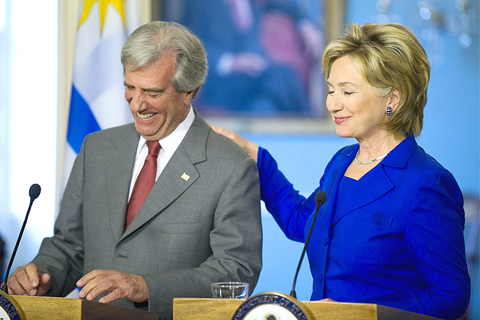US Secretary of State Hillary Clinton on Tuesday urged Venezuela to be transparent over its arms purchases as she and Uruguayan President Tabare Vazquez expressed worry about a regional arms race.
“We have expressed concern about the number of Venezuelan arms purchases,” Clinton told reporters during a joint press conference with Vazquez.
Venezuela’s arms purchases “outpace all other countries in South America, and certainly raise the question as to whether there is going to be an arms race in the region,” the chief US diplomat said.

PHOTO: EPA
“So we urge Venezuela to be transparent in its purchases, clear about its purposes,” Clinton said.
She urged Caracas to set up a system “to ensure that the weapons they buy are not diverted” to insurgent groups or criminal cartels such as drug gangs.
The US is especially worried about Venezuela’s new deal with Moscow to purchase battle tanks, multiple-launch rocket systems, and vehicle-mounted surface-to-air missile systems targeting incoming missiles.
The fledgling Union of South American Nations (Unasur), which includes Uruguay, held a meeting in Ecuador on Tuesday that was called over fears sparked by an agreement allowing the US military access to Colombian bases.
At Colombia’s insistence, the meeting has also been broadened to include discussion of Venezuela’s arms purchases from Russia, and Brazil’s decision to buy French submarines and aircraft.
Vazquez expressed broad concerns without singling out any particular deal.
“With respect to the arms race, not only is our country worried, but we have already expressed time and again our position against an arms race,” Vazquez told reporters.
He said Uruguay opposes an arms race because it diverts resources in a region with a poor distribution of wealth — resources that could be better spent on health, education and housing.
“But it’s a fact, and we can’t deny it, that the countries are buying weapons,” he said.
“South America has millions of people living in poverty, and there are thousands of children that die across Latin America and South America because of child diarrhea or diseases that could be prevented,” he said.
“We should devote our energies and resources to fight against the real scourges of our societies ... such as drug trafficking and terrorism,” he said.
In Caracas, Venezuelan President Hugo Chavez, a fierce US critic, said on Sunday that his country had obtained a US$2.2 billion credit from Russia for arms purchases.
Chavez said Venezuela is buying 92 Soviet-era T-72 main battle tanks, 300mm Smerch multiple-launch rocket systems and vehicle-mounted Russian Antey 2500 surface-to-air missile systems targeting incoming missiles.

In the sweltering streets of Jakarta, buskers carry towering, hollow puppets and pass around a bucket for donations. Now, they fear becoming outlaws. City authorities said they would crack down on use of the sacred ondel-ondel puppets, which can stand as tall as a truck, and they are drafting legislation to remove what they view as a street nuisance. Performances featuring the puppets — originally used by Jakarta’s Betawi people to ward off evil spirits — would be allowed only at set events. The ban could leave many ondel-ondel buskers in Jakarta jobless. “I am confused and anxious. I fear getting raided or even

POLITICAL PATRIARCHS: Recent clashes between Thailand and Cambodia are driven by an escalating feud between rival political families, analysts say The dispute over Thailand and Cambodia’s contested border, which dates back more than a century to disagreements over colonial-era maps, has broken into conflict before. However, the most recent clashes, which erupted on Thursday, have been fueled by another factor: a bitter feud between two powerful political patriarchs. Cambodian Senate President and former prime minister Hun Sen, 72, and former Thai prime minister Thaksin Shinawatra, 76, were once such close friends that they reportedly called one another brothers. Hun Sen has, over the years, supported Thaksin’s family during their long-running power struggle with Thailand’s military. Thaksin and his sister Yingluck stayed

Kemal Ozdemir looked up at the bare peaks of Mount Cilo in Turkey’s Kurdish majority southeast. “There were glaciers 10 years ago,” he recalled under a cloudless sky. A mountain guide for 15 years, Ozdemir then turned toward the torrent carrying dozens of blocks of ice below a slope covered with grass and rocks — a sign of glacier loss being exacerbated by global warming. “You can see that there are quite a few pieces of glacier in the water right now ... the reason why the waterfalls flow lushly actually shows us how fast the ice is melting,” he said.

RESTRUCTURE: Myanmar’s military has ended emergency rule and announced plans for elections in December, but critics said the move aims to entrench junta control Myanmar’s military government announced on Thursday that it was ending the state of emergency declared after it seized power in 2021 and would restructure administrative bodies to prepare for the new election at the end of the year. However, the polls planned for an unspecified date in December face serious obstacles, including a civil war raging over most of the country and pledges by opponents of the military rule to derail the election because they believe it can be neither free nor fair. Under the restructuring, Myanmar’s junta chief Min Aung Hlaing is giving up two posts, but would stay at the